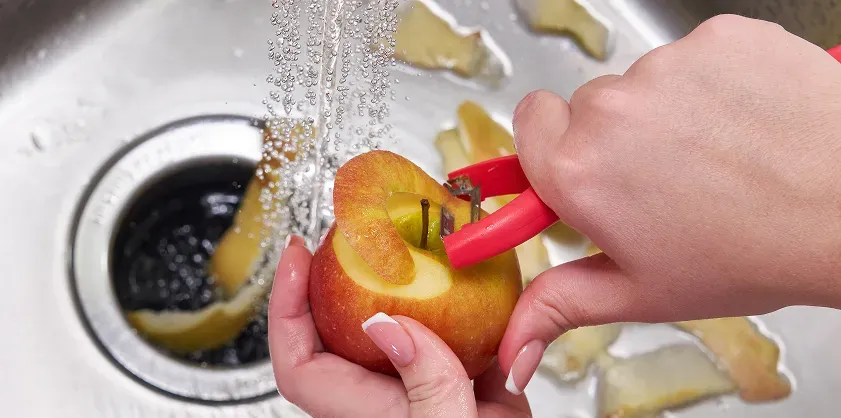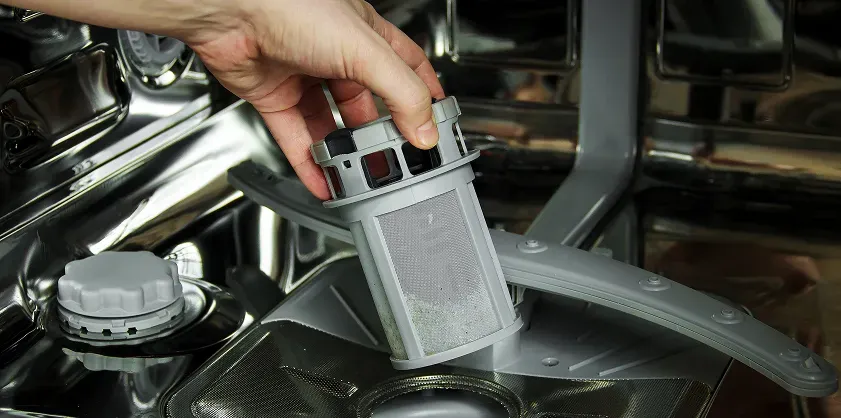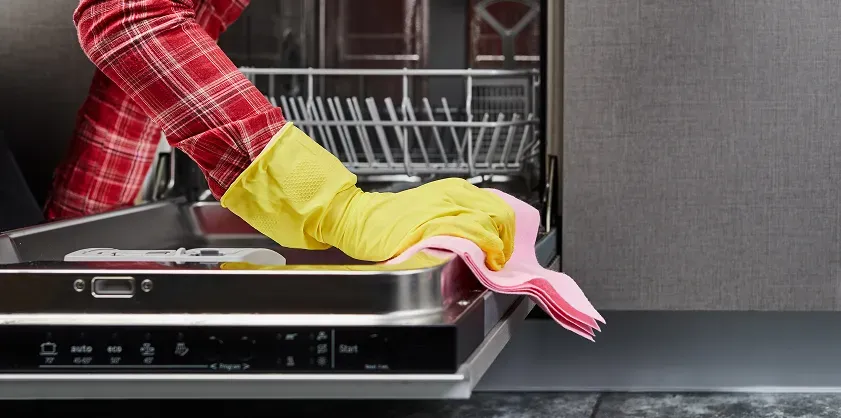Common Dishwasher Problems and How to Fix Them
Fri Apr 18 2025
Imagine cleaning up after a big holiday dinner, only for your dishwasher to start acting up. When dishwashers stop pulling their weight, it’s frustrating. But the good news is that a lot of the most common problems are actually pretty easy to troubleshoot. Our team at Jessup’s is here to help.
Let’s break down what’s going on and what you can do about it without calling a repair tech (at least not right away).

What Are the Most Common Problems with Dishwashers?
If you notice weird noises, standing water at the bottom of the tub, or other irregularities, there might be something wrong with your dishwasher. These are the top culprits:
- Your dishwasher won’t drain
- It won't start
- It smells funky
- It sounds like it’s washing rocks
- It won’t dry your dishes
- It runs, but your dishes still come out dirty
Let’s tackle these one by one.

Problem 1: Why Isn’t My Dishwasher Draining?
Standing water at the bottom of your dishwasher is one of the most common and most annoying problems. It’s also one of the easiest to fix.
How to Fix a Dishwasher Not Draining
✓ Check the drain filter: It might be clogged with food debris. Pop it out and give it a good rinse.
✓ Inspect the drain hose: Look for kinks or blockages. If it’s clogged, you can try flushing it with hot water or gently using a plumber’s snake.
✓ Run your garbage disposal: If your dishwasher drains through it, food scraps stuck in your garbage disposal could be the problem.
✓ Look at the air gap: That little metal thing next to your faucet? If it’s blocked, your dishwasher might not drain properly. Twist it off and clean it.
Is your dishwasher still not draining? It might be the drain pump itself, and that’s when it’s time to call in a pro or check out a new dishwasher at Jessup’s.

Problem 2: My Dishwasher Won’t Start
You press start, and nothing happens. Before you start panicking, check these quick fixes:
How to Fix a Dishwasher That Won’t Start
✓ Check the door latch: Dishwashers won’t start if the door isn’t fully latched. Sometimes crumbs or a broken latch are to blame.
✓ Try the reset: Turn off the dishwasher at the circuit breaker for a minute and then turn it back on. It’s basically a hard reboot.
✓ Child lock might be on: Some models have a lock setting to prevent curious kiddos from turning it on.
✓ Check your power source: It sounds obvious, but it’s worth double-checking. Make sure the plug didn’t wiggle loose or the outlet isn’t dead.
If none of this works, your control board or touchpad might be broken.

Problem 3: My Dishwasher Smells Bad
A smelly dishwasher is one of those problems that creeps up over time. One day, it just hits you.
How to Fix a Smelly Dishwasher
✓ Clean the filter: Again, this area is a magnet for gunk.
✓ Run a cleaning cycle: Toss in a dishwasher-safe bowl of white vinegar and run the hottest cycle. If you include a baking soda rinse after, that’s even better.
✓ Scrub the door seals: They can trap grease and food bits.
✓ Check for standing water: That could mean a drainage issue (scroll back up!).
To keep smells at bay, clean your dishwasher once a month. It’s a good habit, especially if you’re running it every night.
Problem 4: My Dishwasher Is Too Loud
Most modern dishwashers are whisper-quiet. If yours sounds like it’s hosting a rock concert, something’s off.
How to Fix a Noisy Dishwasher
✓ Look for loose utensils: Something might have fallen into the bottom spray arm.
✓ Check the spray arms: Give them a spin to see if they’re hitting anything.
✓ Inspect the pump or motor: A loud grinding sound could mean a failing motor or a piece of glass caught inside.
If your dishwasher is over 10 years old, it might just be showing its age. Bosch dishwashers are known for ultra-quiet performance and some run at just 39-42 dBA. That’s library-level quiet!
Problem 5: My Dishwasher Isn’t Drying My Dishes
Plastic containers that come out wetter than when they went in? We feel your pain.
Dishwasher Problems and Solutions for Poor Drying
✓ Use rinse aid: It helps water slide off dishes during the dry cycle.
✓ Unload the bottom rack first: This keeps water from the top rack from dripping down.
✓ Check your heating element: If it’s broken, your dishwasher won’t dry properly. You can usually spot damage visually (look for cracks or breaks).
✓ Switch to a heated dry cycle: Some eco settings skip the heat to save energy.
Problem 6: My Dishwasher Runs, But My Dishes Still Come Out Dirty
If your dishwasher is technically “working,” but your plates come out with crusty bits or cloudy glassware, something’s not right.
How to Fix a Dishwasher That Isn’t Cleaning Properly
✓ Clean the spray arms: Food particles can block the holes in the spray arms, making it hard for water to reach every dish. Pull them out and rinse them thoroughly.
✓ Don’t overload it: We get it—you want to cram every last mug in there. But overloading blocks water flow and makes it harder for detergent to do its job.
✓ Use the right detergent: Cheap pods or too little detergent can lead to buildup. Hard water? Try a detergent booster.
✓ Check the water temperature: Your dishwasher works best when the water is at least 120°F. If it’s not hot enough, grease and grime won’t break down fully.
✓ Rinse the filter: A dirty filter not only causes draining issues—it also recirculates murky water onto your dishes.
If you’re having a hard time finding a solution to your dishwasher problem, consider upgrading. Check out our handy dishwasher buying guide to narrow down your options and select the best dishwasher for your needs.
Top Dishwashers from Jessup’s
Here are a few dishwashers we swear by—they're quiet, powerful, and easy to maintain:
Bosch 800 Series 24" Dishwasher (Model: SHX78CM5N)
✓ Whisper-quiet at 42 dBA
✓ CrystalDry™ tech for better drying
✓ Flexible loading racks
GE Profile™ UltraFresh System Dishwasher (Model: PDT755SYRFS)
✓ Piranha™ hard food disposer
✓ Dry Boost™ for plastics
✓ Microban® antimicrobial technology
Café™ Smart Stainless Interior Dishwasher (Model: CDT875M5NS5)
✓ Built-in WiFi
✓ Adjustable racks
✓ Stylish matte finish
✓ Shop these dishwashers and more at Jessup’s Appliances!
Explore Dishwashers at Jessup’s
Dishwasher problems are a pain, but they’re not the end of the world. A little troubleshooting can go a long way, and when all else fails, that might just be your dishwasher’s way of telling you it’s time for an upgrade.
If you’re ready to swap out your old machine for something quieter, smarter, and more efficient, come visit one of our local appliance store locations in Florida or explore our selection online. We’ll help you get back to sparkling clean dishes with no stress. Visit our blog for more tips and guides!
Explore the best dishwashers at Jessup’s today.
Related readings:
- Bosch Buying Guide
- GE Buying Guide
- Built-In Refrigerators vs. Freestanding: Which One Is Right for You?
FAQ: Common Dishwasher Troubleshooting Questions
1. What is the most common failure on a dishwasher?
A clogged or dirty filter is the top culprit. It can mess with draining, cleaning, and even cause odors.
2. How long should a dishwasher last?
The average life expectancy is about 10 years, but with good care, some can last up to 15 years.
3. Is it worth it to fix a dishwasher?
It depends on the age and repair cost. If it’s more than 8 years old and the repair is over half the cost of a new unit, replacing it is often the smarter move.
4. How do I descale a dishwasher?
Run an empty cycle with a dishwasher-safe bowl of white vinegar on the top rack. Follow with a baking soda rinse if you want an extra-fresh touch.
5. How often do dishwashers need maintenance?
Basic monthly maintenance (cleaning the filter, running a vinegar rinse) goes a long way. A yearly deep clean is recommended.
Copyright © 2009 - 2025 Company All Rights Reserved.
This site is protected by reCAPTCHA and the Google Privacy Policy and Terms of Service apply.

